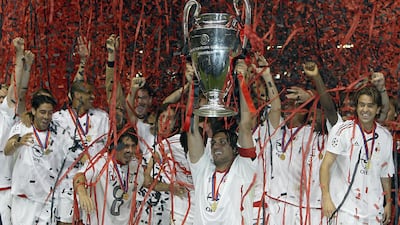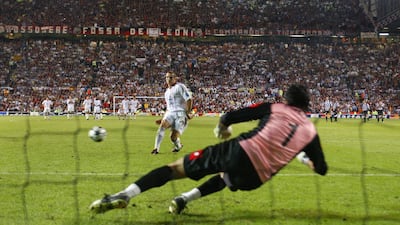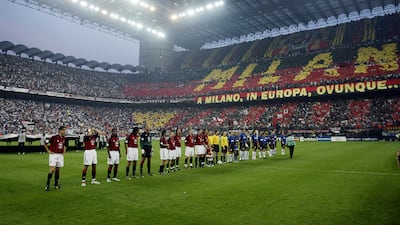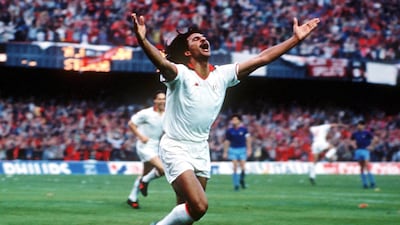AC Milan’s achievements of the late 1970s were cast under the shadow of the Totonero match-fixing scandal, when players and officials of several Italian clubs were found guilty of arranging results with an illegal bookmaking syndicate.
Milan, popularly known as the Rossoneri, in 1980 suffered the ignominy of being demoted to Serie B, Italy’s second division, for their involvement.
They returned to the first tier without fuss, cantering through a league clearly below their lofty standards. The enforced relegation, however, had a lasting effect and it wasn’t easy going once they’d reclaimed their seat at the top table.
Come 1986, enter one Silvio Berlusconi, a Milanese who purported to have been born with the club’s blood coursing through his veins, a claim disputed by those who insist he was a boyhood fan of cross-city rivals Inter Milan. Nonetheless, having amassed vast wealth as a TV and media magnate, Berlusconi bought AC Milan on the promise he would breathe new life into the sleeping giant, a phoenix-from-the-flames scenario.
The fanfare as he burst on to the scene was unprecedented, a glitzy scene featuring helicopters, a Wagner soundtrack and a choreographed dance routine. The aircraft landed and emptied out Milan’s players and coaching staff, leaving only the new owner, who tantalised supporters with a powerful speech and a vow of good times ahead. Few would have imagined how true to his word Berlusconi, who died on Monday, turned out to be.
Arrigo Sacchi was brought in as coach and the team was suffused with a fresh intensity, eschewing Italy’s traditional ultra-defensive methodology. As Berlusconi later declared: “We revolutionised this philosophy and Milan became the team that took to the field to dominate, to win, to create chances, to score plenty of goals, to play quality and entertaining football for the fans and to always respect our opponents.”
The players were encouraged to give their all in training, which hitherto had hardly been customary, and their fitness levels and the high defensive line favoured by Sacchi worked wonders, the Serie A title bagged in his first season. Berlusconi from time to time involved himself directly in playing matters and though this was refuted by Sacchi, he described the club’s owner as the man who “started the renaissance of Italian football” and “gave life to Milan”.

What Berlusconi certainly gave Milan was investment and ambition. The Netherlands were a dominant force in international football at the time and the spine of their team had a phenomenal impact on the Rossoneri. Marco van Basten and Ruud Gullit (signed for a world record fee) were part of Sacchi’s 1987-88 title-winning side (of Van Basten, Berlusconi said he knew he “would have to use all my powers of conviction and persuasion to make him accept our offer. We all know how it went when he came to Milan”).
Frank Rijkaard then joined from Real Zaragoza that summer. Van Basten, with his clinical decisiveness in front of goal, and Gullit’s leadership skills, directness and ability to run with the ball were hugely influential, but Rijkaard was arguably the final piece of the jigsaw, Sacchi transforming the central defender into a holding midfielder whose aggression and athleticism set the tone for the team’s play. The Dutch trio were far from Milan’s only world-class players yet their collective influence was immeasurable.
True, no Serie A titles followed over the next three years but back-to-back European Cups did, shortly before the format changed to the Champions League. Milan made short work of Steaua Bucharest in the 1989 final in Barcelona, thanks to two goals apiece for Gullit and Van Basten. The following year in Vienna, a tighter game was settled when Rijkaard scorched through the Benfica defence to net the only goal.
The mutual respect that formed the bedrock of the Berlusconi-Sacchi relationship was confirmed when the former spoke fondly of the coach “who had a clear idea of football, who could instil in the players the right mindset, someone who could instil teamwork and set specific objectives to achieve”. Berlusconi had found the right man at the right time.

Sacchi left in 1991 to coach the Italian national team and was replaced by Fabio Capello at Berlusconi’s behest. Capello had coached AC Milan’s youth teams and overseen the rise of Paolo Maldini and Alessandro Costacurta, by this time regular fixtures in the first team. If anything, Milan grew in strength under Capello and the seamless switch of managers saw them sweep to the 1991-92 Serie A title undefeated, scoring a barrowload of goals.
They retained the league title not once but twice, swatting aside the domestic opposition with a ruthless swagger. But the perfect storm surely came on the night of May 18, 1994. The Champions League final had pitted Milan against Barcelona, managed by the great Johan Cruyff. Most analysts foresaw an even game of contrasting styles but instead Milan ripped their opponents to ribbons, delivering a footballing masterclass. When Marcel Desailly crashed home Milan’s fourth on the hour mark, they could afford to take their foot off the gas, job done. The 4-0 destruction still goes down as one of European football’s greatest displays.
Capello’s men again won Serie A in 1995-96 but some stale years followed as the team underwent an overhaul. The title was clinched under Alberto Zaccheroni in 1998-99 but Milan didn’t regain their true stature until Carlo Ancelotti took the reins, winning the 2003 Champions League somewhat fortuitously in a penalty shoot-out against Juventus, then Serie A the following season. They reached the European summit once more, Ancelotti guiding them to victory over Liverpool in Athens in 2007, and won the domestic league in 2010-11 under Max Allegri, with some relatively turgid performances between. By this stage the glory days were perhaps over, but what glory days they were. Berlusconi sold his stake in AC Milan to Chinese investors in June 2017 for $630 million and became owner of Monza, now a Serie A side, a year later.
It is tricky to calibrate Berlusconi’s role in all this but he had the foresight to hire Sacchi, Capello and Ancelotti, “the only three coaches I could fully work with, in total harmony, both for Milan’s philosophy and style of play, and for the starting XI they would pick every Sunday and which they would discuss with me before every game”. Sacchi himself spoke of Berlusconi as a visionary.
Looking at the characteristics of today’s super clubs, such as Real Madrid or Manchester United, they have enormous wealth, a pulling power, a magnetism that draws a fan base sprawled around the world. Milan had that in the early 1990s, people wanted to watch them, not only their fans but a wider football public.
Ancelotti, who has gone on to become one of the most successful coaches in history, has said Berlusconi “will be impossible to match” and told of when he rang Milan’s president and begged: “Buy me [Alessandro] Nesta and we’ll win the Champions League.” Berlusconi did and Milan duly obliged.
Much can be said of Berlusconi and his antics as Italy’s prime minister and the controversy that seemed to follow his every step. But those initial years of his ownership, especially from 1988-1996, bore the rise of football’s first super club. As he himself said: “Thanks to Milan’s victories, I am the most successful president in the history of world football.” It’s difficult to dispute that.












